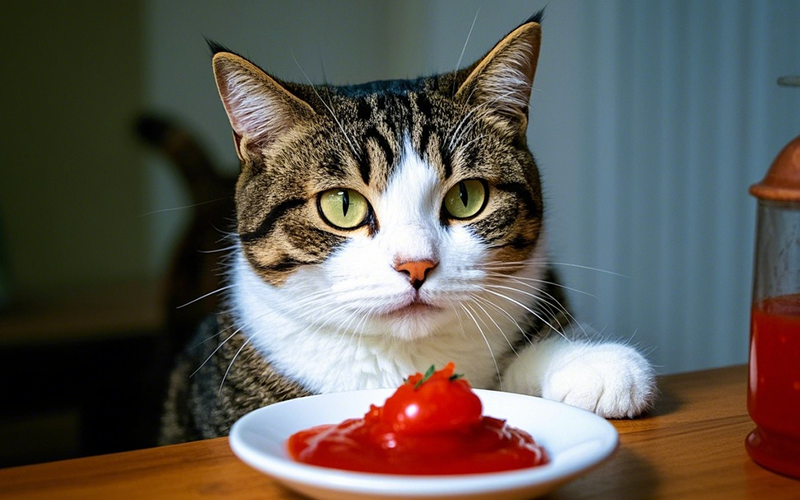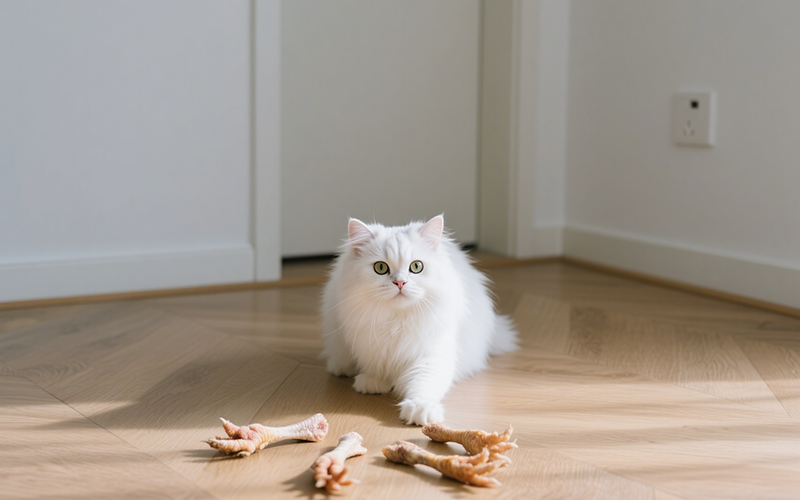Can Cats Eat Ketchup? A Guide to the Red Condiment and Your Feline Friend
- 28 Mar 2025 15:28
Ketchup is a popular condiment that most people have in their kitchens. It's commonly paired with fries, burgers, and other delicious dishes. But as a cat owner, you might wonder, “Can cats eat ketchup?” 🍅 It's important to be cautious about what we share with our pets, especially when it comes to foods that are typically high in sugar, salt, and other ingredients that may not be suitable for them.

Is Ketchup Safe for Cats?
The simple answer is no, ketchup is not a good food for cats. While ketchup isn't toxic to cats in small amounts, it’s best to avoid offering it to them altogether. Here's why:
High Sugar Content: Ketchup contains a significant amount of sugar, which is not ideal for cats. Cats have a limited ability to process sugar in their diet, and consuming too much sugar can contribute to obesity, diabetes, and other health issues. 🍬
Excess Salt: Another concern with ketchup is its high salt content. Too much salt can be harmful to cats and may lead to dehydration, kidney problems, or increased blood pressure over time. 🧂
Vinegar and Other Ingredients: Ketchup typically contains vinegar, onions, and garlic—ingredients that are toxic to cats. While the small amounts in ketchup may not immediately harm your cat, repeated exposure could lead to potential health risks. Onion and garlic, even in trace amounts, can cause damage to your cat's red blood cells and lead to anemia.
Artificial Additives: Many commercial ketchups contain preservatives, flavor enhancers, and artificial colorings, which aren't healthy for your cat. Cats' bodies are not designed to handle artificial chemicals, and these additives could cause digestive upset or other health problems.
Why Cats Shouldn’t Eat Ketchup
While it might seem tempting to share your food with your furry friend, it’s important to remember that cats have different nutritional needs than humans. They require a high-protein diet and very little carbohydrate intake. Ketchup, with its sugars, salts, and artificial ingredients, doesn't meet those nutritional requirements. In fact, it can lead to digestive issues or more serious long-term health problems if given in large quantities.
What Happens if a Cat Eats Ketchup?
If your cat accidentally eats a small amount of ketchup, they may not experience any immediate issues. However, it's a good idea to monitor them closely for any signs of digestive upset, such as vomiting, diarrhea, or a loss of appetite. If your cat eats a larger quantity or frequently consumes ketchup, it could lead to more serious health concerns over time, such as:
Obesity: Due to its high sugar content, regular consumption of ketchup can contribute to weight gain.
Dehydration: The high salt content in ketchup may lead to dehydration, especially if your cat isn't drinking enough water.
Kidney Problems: Excess salt and artificial additives could put additional strain on your cat’s kidneys over time.
What Are Safer Alternatives for Cats?
If you’re looking to treat your cat, there are plenty of healthy, cat-friendly snacks you can offer instead of ketchup. Some good options include:
Cooked Chicken: Plain, cooked chicken is a great source of protein for your cat. Avoid adding any seasoning or sauces, as these could be harmful.
Catnip: Many cats enjoy catnip as a fun and harmless treat. It’s safe, natural, and can provide mental stimulation.
Pumpkin: A small amount of plain pumpkin (without spices or sugar) is an excellent treat for your cat. It’s high in fiber and can help with digestion.
Cat Grass: If your cat enjoys chewing on plants, cat grass can be a healthy and safe option. It can aid digestion and help prevent hairballs.
How to Keep Your Cat Safe
It’s important to avoid feeding your cat any food that’s not specifically designed for them. Ketchup is a human food that doesn’t offer any nutritional benefits to your cat and may cause health issues in the long run. If you’re ever uncertain about whether a certain food is safe for your cat, you can always use tools like PettureX. This pet AI software offers 24-hour online consultation and pet image recognition, allowing you to quickly check whether a specific food or treat is safe for your cat to consume. 📱
Conclusion
In conclusion, ketchup should not be a regular part of your cat’s diet. It’s not toxic in small amounts, but the high sugar, salt, and artificial ingredients make it an unhealthy choice for your feline friend. Stick to cat-friendly treats and always consult a tool like PettureX to ensure you’re offering only the best for your cat’s health and well-being. Keep your cat happy, healthy, and safe! 🐾
Related

Can Cats Eat Egg Yolk Raw? A Vet's In-Depth Guide to Feline Nutrition & Safety
- 10 Jun 2025
Can Cats Eat Dog Kibble? Unpacking the Nutritional Mismatch!
- 29 May 2025
Can Cats Eat Deli Turkey? Slicing Through the Facts for Your Feline!
- 29 May 2025
Can Cats Eat Deer Meat? Exploring Venison for Your Feline!
- 28 May 2025
Can Cats Eat Corned Beef? Unpacking This Salty Human Delicacy!
- 28 May 2025
Can Cats Eat Cooked Rice? The Grain Truth for Your Feline Friend!
- 27 May 2025
Can Cats Eat Cornbread? A Crumb of Truth for Curious Cat Owners!
- 27 May 2025
Can Cats Eat Cooked Meat? Sizzling Facts for Your Feline's Feast!
- 26 May 2025
Can Cats Eat Chili? Spicing Up the Truth About This Human Dish!
- 26 May 2025
Can Cats Eat Chicken Feet? A Paw-sitive or Negative Treat?
- 24 May 2025
